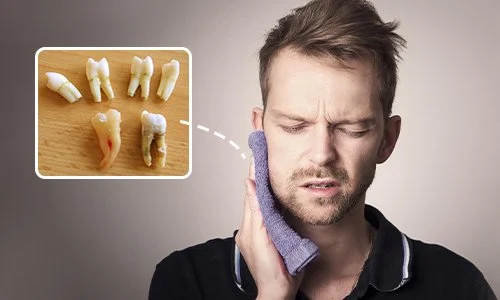Wisdom teeth, also known as third molars, are the last set of teeth to emerge, typically appearing between the ages of 17 and 25. While some people experience no issues when these teeth erupt, many face discomfort, misalignment, or oral health complications. Because of this, wisdom tooth extraction has become a common dental procedure. The key to avoiding serious dental problems lies in recognizing the early warning signs that indicate the need for removal.
In this blog, we’ll discuss the early signs you might need wisdom tooth extraction and why paying attention to them is crucial for long-term dental health.
1. Persistent Jaw Pain or Discomfort
One of the most common symptoms of problematic wisdom teeth is pain or stiffness in the jaw. As wisdom teeth erupt, they can push against neighboring teeth or become trapped in the gum tissue (a condition called impaction). This pressure often leads to soreness around the jaw joint and difficulty opening or closing the mouth.
Ignoring this discomfort may allow the problem to worsen, eventually affecting how you chew or speak. If jaw pain persists, it’s a clear sign to schedule a dental evaluation.
2. Gum Swelling and Tenderness
When wisdom teeth begin to erupt, they often push through the gum line in awkward positions. This can cause redness, swelling, and tenderness in the gums. Sometimes, a flap of gum tissue forms over a partially erupted tooth, creating a pocket where bacteria and food particles accumulate. This can lead to painful inflammation known as pericoronitis.
If you notice swelling or persistent soreness around the back of your mouth, it may indicate the need for extraction before infection sets in.
3. Frequent Headaches or Earaches
It may surprise you, but headaches and earaches can be linked to wisdom teeth. As these teeth attempt to find space in an already crowded jaw, they put stress on surrounding nerves and tissues. This strain can radiate beyond the jaw, leading to tension headaches or discomfort near the ears.
If you frequently experience headaches without a clear cause, your wisdom teeth could be the hidden culprit.
4. Bad Breath and Unpleasant Taste
A partially erupted wisdom tooth often creates spaces where brushing and flossing are difficult. Bacteria and food debris collect in these areas, leading to bad breath (halitosis) or a persistent bad taste in the mouth.
If you notice bad breath despite maintaining good oral hygiene, your wisdom teeth may be harboring bacteria that professional cleaning alone can’t resolve. Extraction is often the only long-term solution. For those in need of wisdom tooth removal in Mysore, Murthy Dental Clinic offers expert care to address this issue and ensure your oral health is restored.
5. Tooth Crowding and Misalignment
Wisdom teeth don’t always have enough room to grow properly. As they emerge, they can push against nearby teeth, causing crowding or shifting of the bite. This is especially concerning for individuals who have undergone orthodontic treatment like braces, as wisdom teeth can undo years of alignment work.
If your teeth begin to shift or feel tighter than before, it’s a warning sign that your wisdom teeth may be exerting pressure and need evaluation.
6. Repeated Cavities Near the Wisdom Teeth
When wisdom teeth are misaligned or partially erupted, they are harder to clean properly. This increases the risk of cavities, not only in the wisdom teeth themselves but also in the adjacent molars. The back corners of the mouth are already tricky to reach with a toothbrush, and wisdom teeth add to the challenge.
If your dentist notices recurring decay near the wisdom teeth, they may recommend extraction to prevent damage to surrounding teeth.
7. Cysts or Jaw Stiffness
In some cases, impacted wisdom teeth can lead to the formation of cysts—fluid-filled sacs that form around the tooth. If left untreated, cysts can damage bone, nerves, and nearby teeth. While not always painful at first, cysts often result in jaw stiffness, swelling, and long-term complications if ignored.
Routine dental X-rays can detect such issues early, even before symptoms worsen.
8. Recurrent Infections
Because wisdom teeth are prone to trapping bacteria, they can cause recurring gum or oral infections. This can lead to pain, swelling, difficulty chewing, and sometimes fever. Recurrent infections are a strong indicator that the teeth are problematic and may need removal to protect your overall oral health.
Why Early Detection Matters
Ignoring the early signs of wisdom tooth problems can lead to serious consequences, including:
- Permanent damage to nearby teeth
- Chronic gum infections
- Misaligned bite and orthodontic relapse
- Bone or nerve damage due to untreated cysts
Early evaluation by a dentist or oral surgeon helps prevent these complications. In many cases, extraction is easier and recovery is quicker when done before severe symptoms appear.
What to Expect During Extraction
If your dentist recommends wisdom tooth removal, you’ll undergo a detailed evaluation with X-rays to assess the position of the teeth. Depending on your case, extraction may be simple (for fully erupted teeth) or surgical (for impacted ones).
Recovery generally takes about a week, with swelling and mild discomfort that can be managed with medication and proper care. Following your dentist’s aftercare instructions ensures smooth healing.
Wisdom teeth don’t always cause problems, but when they do, the signs are often hard to miss. Jaw pain, gum swelling, bad breath, headaches, and shifting teeth are all early indicators that extraction may be necessary. Addressing these symptoms promptly not only relieves discomfort but also prevents long-term dental complications.
If you’re experiencing any of these warning signs, schedule a consultation with your dentist to discuss whether wisdom tooth extraction is right for you. Taking action early can safeguard your smile for years to come.





Comments